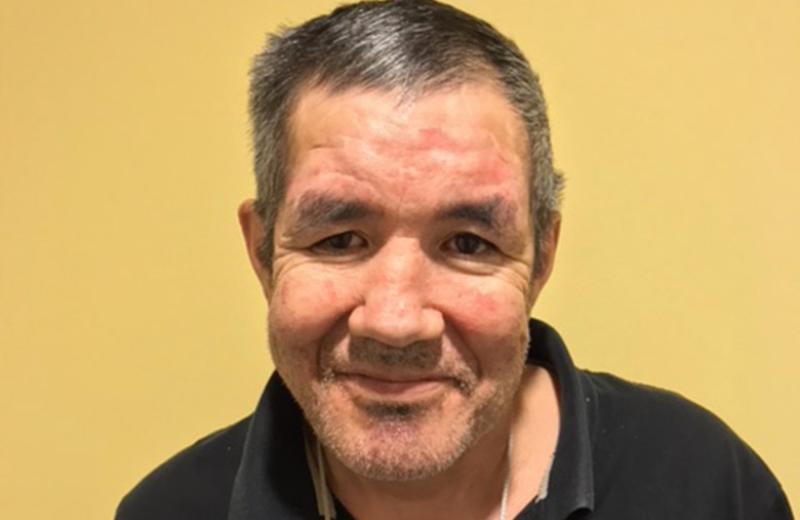Garry McPhee, 50, is a member of the Tahltan First Nation in Northern British Columbia, which includes the communities of Telegraph Creek and Dease Lake. The Fort St. John resident had struggled with alcohol addiction, and also suffers from seizures. For much of the past 20 years, Garry has been homeless.
In June 2016, Northern Health’s Intensive Case Management Team (ICMT) became involved in Garry’s care. This story describes how the team was able to help Garry tap into his own inner strength and courage, and support him to abstinence, dignity, and independence.
The Intensive Case Management Team gets involved
The ICMT is a multidisciplinary team whose goal is to improve its clients’ health and social functioning. The team works with people who struggle with both substance use and mental illness. They provide case management and support navigating health and social services. The team also plays an important role in advocating with community services to ensure quality care for their clients. The team is made up of substance use specialists, life skills workers, and nurses.
The ICMT became part of Garry’s life in June 2016.
“Before:” A dangerous situation
At this point, Garry’s life was chaotic and his health was poor. He was drinking, his seizures became unmanageable, and he was in danger of becoming homeless again. During a 6-month period, Garry spent over 60 days in hospital due to his deteriorating health.
During the 113 days he wasn’t in hospital, Garry visited Emergency 190 times — an average of 1.6 times per day – often arriving by ambulance or RCMP. Fort St. John paramedics, emergency room staff, and RCMP officers all knew him on a first-name basis.
When ICMT became involved, Garry was living at the Northern Centre of Hope in Fort St. John, using his income assistance cheque to pay for room and board. Garry was soon housed in the Supportive Recovery Bed program, a housing program for homeless people who are struggling with substance use.
In the past Garry had tried residential treatment, but due to a negative experience, he was wary of attending again. He rarely saw his family doctor.
Building trust and setting the stage for change
When the ICMT started working with Garry, their first priority was to build a trusting relationship: they met him regularly, whether at the Northern Centre of Hope, the hospital, or on the street. With his participation, Garry and the team created a patient-centred plan to enhance his quality of care.
Sometimes their interactions with Garry would just be to say “Hi!” and ask about his day. At other times, the ICMT had a more varied role:
- Helping Garry learn about being safe and healthy, despite his alcohol use.
- Helping him manage his medications.
- Attending medical appointments with him.
- Arranging ongoing physical and mental health assessments.
- Coordinating his care, including social services.
- Ensuring he attended for regular lab work.
Together with emergency department staff, the ICMT team developed an emergency department care plan for Garry. This was to make sure that when Garry was in hospital, he’d get the best care possible.
The team also met often with Northern Centre of Hope staff to give them support around working with Garry, and to make sure he could keep his housing with them.
As well, ICMT encouraged Garry to:
- See his family doctor regularly, and follow up with lab work when needed.
- Visit community psychiatric services.
ICMT also collaborated with Garry’s family doctor and psychiatrist to ensure he was receiving the best care.
During ICMT’s involvement, there were significant changes. Garry had only 135 visits to the emergency department and spent only 20 days in hospital — a 29% reduction in emergency department visits, and a 67% reduction in hospital days.
ICMT also helped Garry apply for BC’s Persons with Disabilities program (PWD). He successfully joined the program, giving him a more secure source of income.
Throughout, ICMT always respected Garry’s dignity and his right to make his own decisions. Garry was always the one in charge of any changes that were made.
Tragedy brings a fresh challenge
Garry is the oldest of five children, and he and his younger brother were very close. They lived together at the Northern Centre of Hope and spent most of their time together. The brothers were always looking out for each other.
But in July 2017, Garry’s brother passed away. This was a very difficult time for Garry and he thought about moving back to the Yukon, even though he knew that he would likely return to drinking. ICMT checked in with Garry regularly to offer any support they could.
Garry had been undecided about residential treatment for his alcohol use. His experience at the previous treatment centre wasn’t positive, and he had been worried about leaving his brother and mother behind in Fort St. John.
But after his brother died, Garry’s feelings changed. When he was offered a spot in a residential program in Prince George, he took the brave step of deciding to go. ICMT worked with the treatment centre in advance to make sure that Garry would have the best possible chance for success.
Before attending treatment, Garry stayed in the Prince George Detox Centre. There he attended recovery groups, met the staff, and heard other clients’ stories about recovery. After hearing many positive reviews, he was excited about going to the treatment centre. After he completed detox, Garry attended residential treatment for 42 days.
“After:” A new life of abstinence and dignity
Since finishing treatment and returning home to Fort St. John, Garry’s life has been a catalogue of independence, self-care, and confidence. It’s a stunning contrast to his old life. His experience is a testament to the support from the ICMT staff, and proof of this man’s courage and strength in making real change:
- Garry has abstained from alcohol, and he’s been attending AA meetings. Instead of drinking, he spends time with friends at the Northern Centre of Hope or cooks meals with them, which they eat together while watching sports.
- He attended the treatment centre’s refresher program in June 2018, and may attend again in June 2019.
- He regularly visits the hospital to see his mother in Peace Villa or to say a quick “Hi and thank you” to emergency room staff.
- He has been arranging his own medical appointments without ICMT’s help.
- He’s currently renting a room in the high barrier housing program at the Northern Centre of Hope.
- Garry is a caring and responsible pet owner, ensuring his 15+ goldfish are always fed and happy.
- And, finally, Garry volunteers weekly at the Salvation Army clothing store in Fort St. John.
This inspiring story shows the massive difference that coordinated team care can make to a person’s life and health. It’s also a deeply humbling story that reminds all of us that it’s never too late for change.
Northern Health thanks the Intensive Case Management Team for their outstanding work with Garry, and most importantly, we thank Garry for sharing this uplifting story – we know it will inspire many others.














Comments